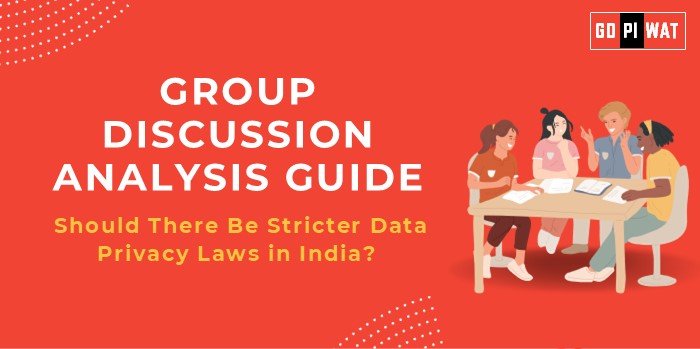📋 Group Discussion Analysis Guide: Should There Be Stricter Data Privacy Laws in India?
🌐 Introduction to the Topic
As India advances its digital transformation, data privacy emerges as a cornerstone for protecting individuals and fostering trust. With 954 million internet users, ensuring robust data protection is critical for sustaining growth and security. While the Digital Personal Data Protection Bill (2023) is a step forward, questions about its adequacy to address increasing cyber threats remain.
📊 Quick Facts and Key Statistics
- 📶 Internet Users in India: 954 million+ – Highlights the vast exposure of personal and corporate data.
- ⚠️ Cybersecurity Incidents: Over 1.4 million cases reported in 2022 (CERT-In) – Demonstrates the scale of cyber threats.
- 💰 Digital Economy Size: Projected to reach $1 trillion by 2027-28 – Underscores the critical role of secure digital systems in economic growth.
- 🏅 Global Cybersecurity Index: Tier 1 status in 2024 with a score of 98.49/100 – Reflects India’s commitment to cybersecurity.
👥 Stakeholders and Their Roles
- 🏛️ Government: Enacts laws and ensures enforcement.
- 💼 Private Sector: Holds user data and must ensure compliance and transparency.
- 👨👩👧👦 Citizens: Require awareness and digital literacy.
- 💻 Tech Companies: Develop systems to safeguard user data and comply with regulations.
- 🌍 International Organizations: Influence policies through global frameworks like GDPR.
🏆 Achievements and Challenges
✅ Achievements
- 🏅 Tier 1 status in the Global Cybersecurity Index 2024 with a score of 98.49.
- 📈 Increasing public awareness of data rights.
- 🔒 Adoption of encryption and secure technologies by key sectors like fintech.
⚠️ Challenges
- 📜 Inadequate Legal Provisions: Existing laws require strengthening for comprehensive coverage.
- 🌐 Digital Divide: Low digital literacy in rural areas and underserved populations.
- ⚙️ Implementation Barriers: Limited enforcement mechanisms in remote regions.
- 🌍 Global Comparisons: While India ranks highly, integrating global best practices remains essential.
💡 Structured Arguments for Discussion
- ✅ Supporting Stance: “Stricter data privacy laws will enhance user trust and protect against rising cyber threats.”
- ❌ Opposing Stance: “Overregulation may hinder innovation and create compliance burdens for startups.”
- ⚖️ Balanced Perspective: “India should adopt a phased approach to legislation, ensuring balance between security and innovation.”
📖 Effective Discussion Approaches
- 📈 Opening Approaches:
- Highlight India’s Tier 1 cybersecurity status and its digital economy potential.
- Mention rising cybersecurity threats to emphasize the urgency for stricter laws.
- 💬 Counter-Argument Handling:
- Recognize industry concerns while proposing adaptive regulations.
- Use global success stories, such as GDPR, to illustrate the potential of robust data laws.
🔍 Strategic Analysis of Strengths and Weaknesses
- 💪 Strengths: Strong global cybersecurity ranking; increasing public awareness.
- 📉 Weaknesses: Gaps in implementation and rural outreach.
- 🌟 Opportunities: Establish leadership in global digital governance.
- ⚠️ Threats: Escalating cyberattacks and potential loss of user trust.
🎓 Connecting with B-School Applications
Understanding data privacy laws and their implications ties into B-school themes like business ethics, governance, and digital transformation.
💼 Real-World Applications
- Integration of cybersecurity practices in corporate governance.
- Digital marketing strategies ensuring compliance with data privacy laws.
- Building secure supply chains in tech-driven industries.
📄 Sample Interview Questions
- “How does India’s Tier 1 cybersecurity ranking influence its global digital position?”
- “What challenges do Indian startups face with data privacy compliance?”


